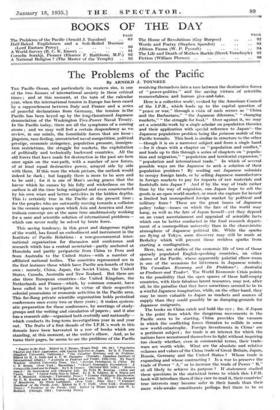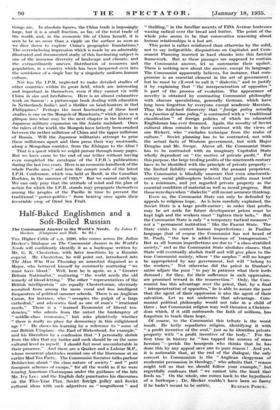The Problems of the Pacific
By ARNOLD J. TOYNBEE
Tax Pacific Ocean, and particularly its western run, is one of the two focuses of international anxiety in these critical times ; and at this moment, at the turn of the calendar year, when the international tension in Europe has been eased by a rapprochement between Italy and France and a series of peaceful declarations from Germany, the tension in the Pacific has been keyed up by the long-threatened Japanese denunciation of the Washington Five-Power Naval Treaty. In the Pacific today, there are all the symptoms of a coming storm ; and we may well feel a certain despondency as we review, in our minds, the formidable forces that are loose : jingoism, race-feeling, unrestricted naval competition, political prestige, economic stringency, population pressure, immigra- tion restrictions, the struggle for markets, the exploitation of politically and technically backward countries. All the old forces that have made for destruction in the past are here once again on the war-path, with a number of new forces, of at least equal destructive power, arrayed side by side with them. If this were the whole picture, the outlook would indeed be dark ; but happily there is more to be seen and to be said ; for it is one of Man's saving graces that the havoc which he causes by his folly and wickedness on the surface is all the time being mitigated and even counteracted by his own wiser and better activities in the hidden depths. This is certainly true in the Pacific at the present time ; for the peoples who are outwardly moving towards a collision in the oceanic spaces upon which Asia and America and Aus- tralasia converge are at the same time unobtrusively working for a sane and scientific solution of international problems— which can never really be solved by brute force.
This saving tendency, in this great and dangerous region of the world, has found an embodiment and instrument in the Institute of Pacific Relations : a non-governmental inter- national organization for discussion and conference and research which has a central secretariat—partly anchored at Honolulu and partly peripatetic from China to Peru and from Australia to the United States—with a number of affiliated national bodies. The countries represented are in the first instance those which have Pacific sea-boards of their own : namely, China, Japan, the Soviet Union, the United States, Canada, Australia and New Zealand. But there are also three European countries—the United Kingdomf the Netherlands and France—which, by comm. on consent, have been called in to participate in virtue of their respective colonial possessions or economic activities in the Pacific area. This far-flung private scientific organization holds periodical conferences once every two or three years ; it makes system- atic preparation for these conferences, by meetings of study- groups and the writing and circulation of papers ; and it also has a research side—organized both centrally and nationally— which conducts its long-term investigations year in and year out. The fruits of a first decade of the I.P.R.'s work in this domain have been harvested in a row of books which are standing, at this moment, at the writer's elbow. And, as he turns their pages, he seems to see the problems of the Pacific Empire in the East. Edited by J. Barnes. (Kegan PauL 10s. Bd.) 1- Population Theories and Their Application. with Special Reference to Japan. By E. F. Penrose. (Stanford University, California.) • The Canadian Economy and its Problem,. Edited by H. A. Innis and A. F. W. Plumptre. (Toronto : Canadian Institute of International Affairs.) 4 Australia as Producer and Trader, 1920-1932. By Nancy Windett. (Oxford University Press. 15s.) • Foreign Investments in China. By C. F. Remer. (New York : Macmillan.) • China's Geographic Foundations : A Survey of the Land and its People. By S. B. Cresscy. (McGraw-Hill. 1934.) • Modern Sanwa Its Government and Changing Life. By Felix M. Keening. (Allen and Unwin. 16s.) Island India Goes to School. By E. R. Embree, M. S. Simon and W. B. Mumford. (Chicago : • University Press.) • Taming Philippine Headhunter,. By F. M. Keening and M. Keesing. (Allen and Unwin- 10s. .) " The Mongols of Manchuria. By Owen Lattimore. (New York : John Day.) " Economic Handbook of the Pacific Area Edited by F. V. Field. (New York : Doubleday Doran.) " Problem, of the Pacific. 1933. Edited by Bruno Lasker and W. L. Holland. (Chicago, 1934: University Prem.)
resolving themselves into a race between the destructive forces of " power-politics " and the saving virtues of scientific resourcefulness and human give-and-take.
Here is a collective work', evoked by the American Council of the I.P.R., which leads up to the capital question of " peace or war," through a vista of such scenes as " China and the Barbarians," " the Japanese dilemma," " changing markets," " the struggle for food." Over against it, we may set a scientific work by a single scholar on population theories and their application with special reference to Japan 2—the Japanese population problem being the primum mobile of the Pacific tornado. This book is similar in structure to the other —though it is on a narrower subject and from a single hand —for it closes with a chapter on " population and conflict," and leads up to this through a series of chapters on " popula- tion and migration," population and territorial expansion," " population and international trade." In which of several possible ways are the Japanese to seek a solution of their population problem ? By sending out Japanese colonists to occupy foreign lands, or by selling Japanese manufactures in foreign markets to pay for imports of raw materials and foodstuffs into Japan ? And if by the way of trade rather than by the way of migration, can Japan hope to sell the goods in an open world-market, or must she capture for herself a limited but monopolized foreign market by political and military force ? These are the great issues of Japanese policy today—issues on which the fate of the world may hang, as well as the fate of Japan herself—yet they depend on an exact ascertainment and appraisal of scientific facts which can be better conducted in the food research depart- ment of a cosmopolitan university than in the chauvinistic atmosphere of Japanese political life. While the sparks are flying at Tokyo, some discovery may still be made at Berkeley which will prevent those reckless sparks from starting a conflagration.
Here, too, are studies of the economic life of two of those sparsely populated English-speaking countries, on other shores of the Pacific, whose apparently palatial elbow-room is one of the occasions for bitterness in Japanese minds: The Canadian Economy and Its Problems' ; Australia as Producer and Trader4. The World Economic Crisis points to the possibility that the open spaces of these half-empty countries, with their fabulous latent resources, may not, after all, be the paradise that they have sometimes seemed to be to a wistful Japanese imagination, while, on the other hand, they may be more valuable to Japan as markets and sources of .supply than they could possibly be as dumping-grounds for Japanese emigrants.
The books on China catch and hold the eye ; for, if Japan is the point from which the dangerous movements in the Pacific seem to be starting, China provides the vacuum in which the conflicting forces threaten to collide in some new world-catastrophe. Foreign investments in China' are a pertinent subject ; for trade is an interest for which the nations have accustomed themselves to fight without inquiring too closely whether, even in commercial terms, their trade- wars are worth while. What are the absolute and relative volumes and values of the China trade of Great Britain, Japan, Russia, Germany and the United States ? Whose trade is expanding and whose contracting ? Is a war to preserve the trade of Power " A," or to increase the trade of Power " B," at all likely to achieve its purpose ? If statesmen studied these questions in the statistical terms to which this I.P.R. book will introduce them if they care to read it, their countries' true interests may become safer in their hands than their more wide-awake constituents perhaps feel them to be as
things are. In absolute figures, the China trade is imposingly large, but it is a small fraction, so far, of the total trade of the world, and, in the economic life of China herself, it is seen to be no more than a ripple on the surface as soon as we dive down to explore China's geographic foundations.° The overwhelming impression which is made by an admirably illustrated and documented study of this fascinating subject is one of the immense diversity of landscape and climate, and the extraordinarily uneven distribution of resources and population, in a country which has been lacquered over into the semblance of a single hue by a singularly uniform human culture.
Nor has the I.P.R. neglected to make detailed studies of Other countries within its great field, which are interesting and important in themselves, even if they cannot vie with China in size and fatefulness. Here is an almost exhaustive work on Samoa' ; a picturesque book dealing with education in Netherlands India °, and a thriller on head-hunters in thel Philippines.* Perhaps the most fascinating of these local studies is one on the Mongols of Manchuria," which gives us a glimpse into what may be the next chapter in the history of Japanese military expansion on the Asiatic mainland. Once the rulers of the world, the Mongols have latterly been crushed between the nether millstone of China and the upper millstone of Russia. Will the Japanese militarists attempt to prise these millstones apart and then press their way westwards, along a Mongolian corridor, from the Khingan to the Altai ?
That is a quest which we might pursue through many pages. But we have come to the end of our tether without having even completed the catalogue of the I.P.R.'s publications during the last two years. Here is an economic handbook of the whole Pacific area," and here the compte rendu of the latest I.P.R. Conference, which was held at Banff, in the Canadian Rockies, in the summer of 1933." But we cannot catch up. We can only pray that the attitude of mind and the plan of action for which the I.P.R. stands may propagate themselves among the peoples of the Pacific in time to prevent the traditional power-politics " from bearing once again their invariable crop of Dead Sea Fruit.







































 Previous page
Previous page